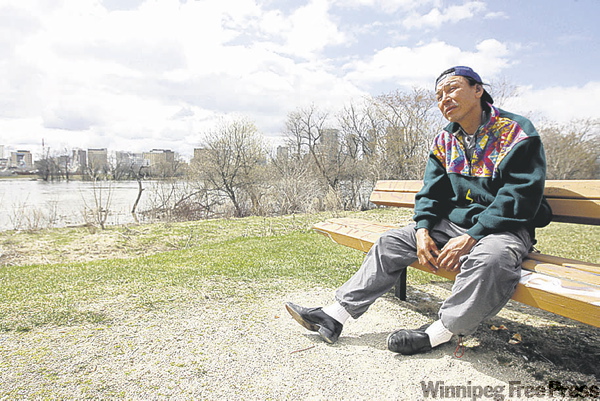Man who’s satisfied doesn’t need change
Advertisement
Read this article for free:
or
Already have an account? Log in here »
To continue reading, please subscribe:
Monthly Digital Subscription
$0 for the first 4 weeks*
- Enjoy unlimited reading on winnipegfreepress.com
- Read the E-Edition, our digital replica newspaper
- Access News Break, our award-winning app
- Play interactive puzzles
*No charge for 4 weeks then price increases to the regular rate of $19.00 plus GST every four weeks. Offer available to new and qualified returning subscribers only. Cancel any time.
Monthly Digital Subscription
$4.75/week*
- Enjoy unlimited reading on winnipegfreepress.com
- Read the E-Edition, our digital replica newspaper
- Access News Break, our award-winning app
- Play interactive puzzles
*Billed as $19 plus GST every four weeks. Cancel any time.
To continue reading, please subscribe:
Add Free Press access to your Brandon Sun subscription for only an additional
$1 for the first 4 weeks*
*Your next subscription payment will increase by $1.00 and you will be charged $16.99 plus GST for four weeks. After four weeks, your payment will increase to $23.99 plus GST every four weeks.
Read unlimited articles for free today:
or
Already have an account? Log in here »
Hey there, time traveller!
This article was published 09/05/2009 (6056 days ago), so information in it may no longer be current.
"Let me be the way I want to be. I’m not bothering nobody."
— homeless hero Faron Hall

He spoke those words while we were sitting together on the park bench he sleeps on, near the place in the swollen, swift-moving Red River where on Sunday the soon-to-be- 45-year-old rescued a 19-year-old man who had accidentally fallen from the Provencher Bridge.
It was Tuesday now.
And we were alone where Faron was, in a sense, being the way he wanted to be. He was intoxicated.
As he also appeared to be when he swam out to perform his spontaneous act of valour. Yet he was still able to clearly form the impression that there were people who wanted to "rescue" him from a different "river" with an even more treacherous undertow.
The one that flows from a bottle.
Wanting to save someone like Faron is understandable, of course. He’s articulate, humble, caring and instantly likable. He’s even been to university.
But all that "potential," as he put it, was swamped by the sadness of a series of violent family tragedies. Which is how Faron finally fell into the "river" that washes him up each night on the banks of the Red. And ultimately delivered him into our consciousness.
Especially the consciousness of Juanita Giesbrecht, a woman who understands Faron’s plea to let him be.
"ö "ö "ö
Dear Mr. Sinclair,
I was moved to write to you because of a line in your column that took me back to a place long ago. You wrote, "Then he said this: ‘Let me be the way I want to be. I’m not bothering nobody.’"
In the early ’70s I was a social worker in Flin Flon and during the course of my work I encountered a fellow one could not help but like. He was a little guy — small in stature — of indeterminate age, smelled awful, was seldom sober, but he had a smile that tugged at my heart and a thoroughly pleasing manner. He was always respectful towards me if I passed him on the street or he came to the office looking for "welfare," as he called it.
One day, I happened to see my little buddy on a road. He wanted to go to visit his sister in a small community south of Flin Flon. I offered him a ride. During the course of the conversation, I asked him if he would like to go to St. Rose to "dry out."
"Miss," he said, "I really appreciate what you are trying to do for me, but don’t try to change me. I like who I am; it’s the only life I know. I’m warm in winter and in the summer I get by."
I learned a very important lesson that day. I left social work to pursue adult education, but his words stayed with me and served as a kind of motto for my practice.
"Don’t try to change me."
I think Faron Hall did a noble thing jumping into a cold, fast-moving river to rescue an unknown and for awhile the attention and hoopla will assuage the collective conscience of the media and a few others who have elevated him to hero status. The sad reality is that, like in the situation I just described, the fanfare will disappear and this homeless man will go back to being who he is. But maybe he just likes the way he is. Maybe we just have to remember to let him be the way he wants to be because he is "not bothering nobody." Maybe we just have to check on him once in awhile to see if he is OK.
"ö "ö "ö
What struck me about Faron’s words, and Juanita’s letter, is the sense of forgiveness in their message.
Most of us don’t always like who we are. Or, more accurately, how we behave at times.
But we are who we are.
Imperfect beings, who beat ourselves up for not being perfect. Or allow others to do it for us.
Faron’s plea to let him be applies universally, though. At its widest margins, in the political sense, it’s a cry for freedom. And in the narrowest, personally, it’s also a cry for understanding.
This is what I understand.
Faron Hall has found a community on the riverbanks of St. Boniface, a home among the other homeless, where he isn’t judged. Where he is free to be the way he wants to be.
Now maybe you understand, too.
We should all be so blessed.
gordon.sinclair@freepress.mb.ca


